![[Asenshi] Jormungand Perfect Order - 24 [nograin][C51D004B].mkv_snapshot_10.25_[2012.12.29_17.03.45] [Asenshi] Jormungand Perfect Order - 24 [nograin][C51D004B].mkv_snapshot_10.25_[2012.12.29_17.03.45]](https://lh3.ggpht.com/-mNO1L7PSk04/UN7AJP6oPkI/AAAAAAACXXQ/DUicgefW7nI/%25255BAsenshi%25255D%252520Jormungand%252520Perfect%252520Order%252520-%25252024%252520%25255Bnograin%25255D%25255BC51D004B%25255D.mkv_snapshot_10.25_%25255B2012.12.29_17.03.45%25255D_thumb.jpg?imgmax=800) |
![[Asenshi] Jormungand Perfect Order - 24 [nograin][C51D004B].mkv_snapshot_12.18_[2012.12.29_17.05.37] [Asenshi] Jormungand Perfect Order - 24 [nograin][C51D004B].mkv_snapshot_12.18_[2012.12.29_17.05.37]](https://lh5.ggpht.com/-tu8ac1votr0/UN7ALfqRxII/AAAAAAACXXc/_C7_J6nU50M/%25255BAsenshi%25255D%252520Jormungand%252520Perfect%252520Order%252520-%25252024%252520%25255Bnograin%25255D%25255BC51D004B%25255D.mkv_snapshot_12.18_%25255B2012.12.29_17.05.37%25255D_thumb.jpg?imgmax=800) |
![[Asenshi] Jormungand Perfect Order - 24 [nograin][C51D004B].mkv_snapshot_14.59_[2012.12.29_17.08.34] [Asenshi] Jormungand Perfect Order - 24 [nograin][C51D004B].mkv_snapshot_14.59_[2012.12.29_17.08.34]](https://lh4.ggpht.com/-vduR6nwUhhk/UN7ANe88HVI/AAAAAAACXXw/d066VCaaI7I/%25255BAsenshi%25255D%252520Jormungand%252520Perfect%252520Order%252520-%25252024%252520%25255Bnograin%25255D%25255BC51D004B%25255D.mkv_snapshot_14.59_%25255B2012.12.29_17.08.34%25255D_thumb.jpg?imgmax=800) |
Perhaps it’s clear now why it was so hard for me to write about Jormungand these last few weeks.
I feel as though I can predict how the reaction to this ending is going to play out. Truth be told, there’s no why I can spin this in my head so that it plays well with the audience – in effect, I think Takahashi-sensei delivered an ending that probably managed to deliver almost no one what they were expecting or, for that matter, what they were hoping for. I have my own thoughts about the way it all turned out which I’ll obviously get to in a minute, but that’s certainly a hugely risky way to bring a series like this to a close.
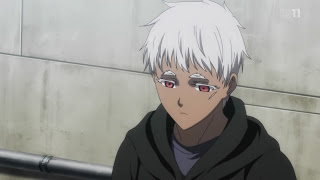 Just to clarify up-front – this ending was (as was the rest of the series) extremely faithful to the manga, right down to the final panel. Kuroda Yosuke is one of the most experienced hands in anime when it comes to adaptation, and there’s a tremendous elegance to the work he’s done here. It seems like a faithful adaptation would be the easiest to write, but it’s actually one of the hardest. Anime and manga are fundamentally so different that it’s actually much easier to introduce a good deal of reinvention. Unless the writer knows what he’s doing, a note-faithful adaptation will be flat – it’ll play like a televised manga, not an anime. Kuroda-san managed to give us the most faithful manga adaptation I’ve ever seen and still (with a lot of help from the cast and soundtrack) make it vibrant, alive, and quite a distinct experience from reading the manga.
Just to clarify up-front – this ending was (as was the rest of the series) extremely faithful to the manga, right down to the final panel. Kuroda Yosuke is one of the most experienced hands in anime when it comes to adaptation, and there’s a tremendous elegance to the work he’s done here. It seems like a faithful adaptation would be the easiest to write, but it’s actually one of the hardest. Anime and manga are fundamentally so different that it’s actually much easier to introduce a good deal of reinvention. Unless the writer knows what he’s doing, a note-faithful adaptation will be flat – it’ll play like a televised manga, not an anime. Kuroda-san managed to give us the most faithful manga adaptation I’ve ever seen and still (with a lot of help from the cast and soundtrack) make it vibrant, alive, and quite a distinct experience from reading the manga.
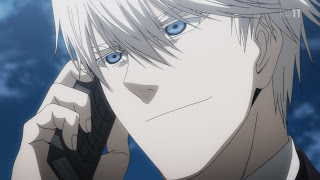 So whatever you feel about the way Jormungand ended up, give the credit or blame to Takahashi, because it’s his vision that played out in this episode. I’ll state for the record that I was certainly frustrated by elements of the finale. There were many things I was hoping would happen that didn’t, but as I’ve reflected on it since I was originally exposed to the material I’ve come to think that the ending is quite faithful to the spirit of the series. I’ve stated many times that Jormungand does very few favors for the audience – it doesn’t make things easy in terms of linear narrative and distinct moral judgments. As I’ve puzzled over this ending and tried to imagine how I would have ended the series if it’d been my choice, I’ve come to realize that it would be impossible to deliver a conventionally satisfying ending without a fundamental shift in approach. Takahashi makes no compromises right up to the end, and in effect I think the way the show ends is a product of a trap that was inherent in his approach to the story.
So whatever you feel about the way Jormungand ended up, give the credit or blame to Takahashi, because it’s his vision that played out in this episode. I’ll state for the record that I was certainly frustrated by elements of the finale. There were many things I was hoping would happen that didn’t, but as I’ve reflected on it since I was originally exposed to the material I’ve come to think that the ending is quite faithful to the spirit of the series. I’ve stated many times that Jormungand does very few favors for the audience – it doesn’t make things easy in terms of linear narrative and distinct moral judgments. As I’ve puzzled over this ending and tried to imagine how I would have ended the series if it’d been my choice, I’ve come to realize that it would be impossible to deliver a conventionally satisfying ending without a fundamental shift in approach. Takahashi makes no compromises right up to the end, and in effect I think the way the show ends is a product of a trap that was inherent in his approach to the story.
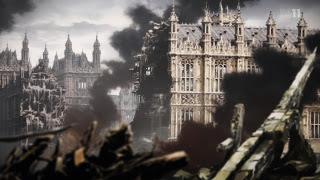 But of course, I couldn’t say any of that until now. And now that it’s over, I can say that for my money, the star of the final episode is one that you wouldn’t necessarily expect, and that’s Kasper. I think he not only delivered many of the best moments in the episode, but he effectively undercut the “Koko End” because it’s his words that stay with me more than anything Koko did. “If I can’t sell aerial weapons, I’ll sell naval weapons. If I can’t sell battleships, I’ll sell tanks. I’ll sell guns. I’ll sell swords. I’ll sell hatchets. If you seal away iron, I’ll sell cudgels. Such is the nature of an arms dealer.” It can hardly be denied that the moment that Koko looked most unhappy in this final episode is when Kasper said “I’m sure Floyd will be pleased.” In effect, Kasper denied Koko the joy of believing her new world would be what she imagined, and he unmasked the truth of her motivations, all with a single short speech.
But of course, I couldn’t say any of that until now. And now that it’s over, I can say that for my money, the star of the final episode is one that you wouldn’t necessarily expect, and that’s Kasper. I think he not only delivered many of the best moments in the episode, but he effectively undercut the “Koko End” because it’s his words that stay with me more than anything Koko did. “If I can’t sell aerial weapons, I’ll sell naval weapons. If I can’t sell battleships, I’ll sell tanks. I’ll sell guns. I’ll sell swords. I’ll sell hatchets. If you seal away iron, I’ll sell cudgels. Such is the nature of an arms dealer.” It can hardly be denied that the moment that Koko looked most unhappy in this final episode is when Kasper said “I’m sure Floyd will be pleased.” In effect, Kasper denied Koko the joy of believing her new world would be what she imagined, and he unmasked the truth of her motivations, all with a single short speech.
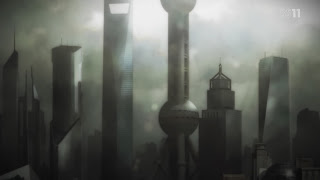 Before the industrial revolution, life expectancy in Europe was roughly in the low 30’s – including about 75% of children dying before the age of five. The advent of the evils of industry – pollution, child labor, dangerous work conditions, environmental destruction – saw life expectancy increase dramatically, including the percentage of children reaching the age of five plunging over 200% in barely half a century. I think the point Takahashi is trying to make here is that the Emperor has no clothes. Koko’s plan is a sham – there is no Eden to return to, and Pandora’s Box can never be closed. What he effectively told her is, “You can pretend you’ve accomplished something, but we both know better – and I’m not going to let you forget it.” It was rather cruel of him, really, but in terms of the story it was something that needed to be said.
Before the industrial revolution, life expectancy in Europe was roughly in the low 30’s – including about 75% of children dying before the age of five. The advent of the evils of industry – pollution, child labor, dangerous work conditions, environmental destruction – saw life expectancy increase dramatically, including the percentage of children reaching the age of five plunging over 200% in barely half a century. I think the point Takahashi is trying to make here is that the Emperor has no clothes. Koko’s plan is a sham – there is no Eden to return to, and Pandora’s Box can never be closed. What he effectively told her is, “You can pretend you’ve accomplished something, but we both know better – and I’m not going to let you forget it.” It was rather cruel of him, really, but in terms of the story it was something that needed to be said.
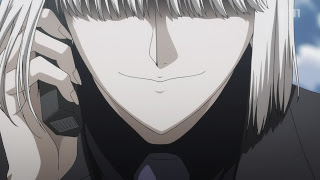 Now – is that something that’s satisfying for an audience that’s been following this story for 24 episodes? Probably not – and I can honestly say it wasn’t all that satisfying for me. If you narrow the focus down to the characters – which I’ve always argued are the true heart of Jormungand – I think it comes down to Jonah admitting his own powerlessness. In my eyes he was perfectly right the minute he walked out on Koko – in effect, that was the high-water mark of the show for idealism and moral clarity. Jonah was really the only one among the central cast who had higher aspirations in life – and I extend that to Koko, for whom Plan Jormungand is mostly about sticking it to her father and trying to impress Jonah. But in the end Jonah checked into a sort of half-robotic mode, following Kasper and living inside his own head, searching for answers.
Now – is that something that’s satisfying for an audience that’s been following this story for 24 episodes? Probably not – and I can honestly say it wasn’t all that satisfying for me. If you narrow the focus down to the characters – which I’ve always argued are the true heart of Jormungand – I think it comes down to Jonah admitting his own powerlessness. In my eyes he was perfectly right the minute he walked out on Koko – in effect, that was the high-water mark of the show for idealism and moral clarity. Jonah was really the only one among the central cast who had higher aspirations in life – and I extend that to Koko, for whom Plan Jormungand is mostly about sticking it to her father and trying to impress Jonah. But in the end Jonah checked into a sort of half-robotic mode, following Kasper and living inside his own head, searching for answers.
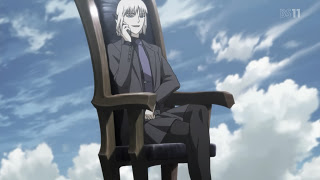 And that’s the problem. Jonah searched for answers for two years. And during those two years, the world behaved exactly as Koko predicted it would. Wars broke out everywhere – over water, oil and rare Earth materials. The USSR re-formed, “Arab Spring” blew up, and terrorists wreaked havoc in the capitols of Europe. It made the mirage that Koko’s plan represents seem no less crazy than standing by and watching the world slowly bleed to death (especially given the fact that she alone among all the characters proved herself capable of truly revolutionary thought), but if there’s anything hopeful in what’s frankly rather a depressing ending, it’s Jonah’s words when he comes back to Koko. “I think both you and the world are crazy. But I’ll stick with you, Koko.” Jonah never accepts the right of what Koko is doing – for him, this is purely a personal decision. The world makes no sense, and the only thing he knows is that Koko is the person he loves (in what sense, it’s left to interpretation). But it’s still a tragic ending, because Jonah’s loss of innocence amounts to an admission that there are no good answers, only compromises we make to try and keep ourselves sane.
And that’s the problem. Jonah searched for answers for two years. And during those two years, the world behaved exactly as Koko predicted it would. Wars broke out everywhere – over water, oil and rare Earth materials. The USSR re-formed, “Arab Spring” blew up, and terrorists wreaked havoc in the capitols of Europe. It made the mirage that Koko’s plan represents seem no less crazy than standing by and watching the world slowly bleed to death (especially given the fact that she alone among all the characters proved herself capable of truly revolutionary thought), but if there’s anything hopeful in what’s frankly rather a depressing ending, it’s Jonah’s words when he comes back to Koko. “I think both you and the world are crazy. But I’ll stick with you, Koko.” Jonah never accepts the right of what Koko is doing – for him, this is purely a personal decision. The world makes no sense, and the only thing he knows is that Koko is the person he loves (in what sense, it’s left to interpretation). But it’s still a tragic ending, because Jonah’s loss of innocence amounts to an admission that there are no good answers, only compromises we make to try and keep ourselves sane.
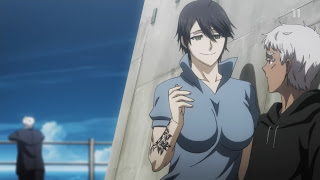 As fantastic a show as this is, there are things I didn’t get out of it at the end that I wish I had. I wish Lehm’s character had gotten a proper arc to fill in the blanks surrounding his character, which for me was always one of the most interesting in the cast (and Unshou Ishizuka was magnificent in the role). I would have liked to have learned more about his odd relationship with Chiquita, who showed a different side of herself in her anger with Kasper for letting Jonah leave in the end (none of the women in this series can resist Jonah’s charms, it seems, not even the fearsome Chiquita). Kasper himself is someone who would have been interesting to follow more often, though I can’t say he was underutilized given how his role was so crucial in the finale. It shouldn’t be forgotten that it was he who saw the potential in Jonah from the start, and brought him into the HCLI orbit. His strengths are different from Koko’s, but in his way he’s every bit as formidable – and probably a lot less insane.
As fantastic a show as this is, there are things I didn’t get out of it at the end that I wish I had. I wish Lehm’s character had gotten a proper arc to fill in the blanks surrounding his character, which for me was always one of the most interesting in the cast (and Unshou Ishizuka was magnificent in the role). I would have liked to have learned more about his odd relationship with Chiquita, who showed a different side of herself in her anger with Kasper for letting Jonah leave in the end (none of the women in this series can resist Jonah’s charms, it seems, not even the fearsome Chiquita). Kasper himself is someone who would have been interesting to follow more often, though I can’t say he was underutilized given how his role was so crucial in the finale. It shouldn’t be forgotten that it was he who saw the potential in Jonah from the start, and brought him into the HCLI orbit. His strengths are different from Koko’s, but in his way he’s every bit as formidable – and probably a lot less insane.
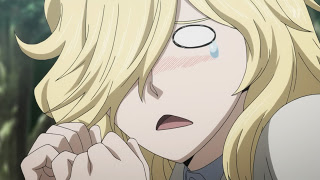 I’m sure that never seeing what the future holds after Koko pushes that button is going to prove most dissatisfying for a chunk of the audience as well, and I can’t say that I blame them. When I speak of the trap Takahashi-san set for himself though, this is a part of it. I don’t see any way he could have showed us what happened afterwards, because the overriding message of the story is more powerful if it ends where it did. I think in any event he told us exactly what’s going to happen, using Kasper’s words – and I don’t think it would have been very pleasurable to see that play out. The fact is that Koko revealed herself in the end to be a megalomaniac of the first order, albeit an amazingly charismatic and clever one (waiting until her quantum computer is small enough to be launched into orbit before clearing the skies is nothing short of brilliant, though I still wouldn’t call her plan foolproof). Like Chrollo Lucilfer in H x H (as I’ve said, in some ways Jormungand is a kind of seinen version) her true genius was in seeing the strengths of those around her, trusting them to do their jobs, and making them willing to die for the cause. But I wouldn’t want to put the fate of the world (or my own) in Chrollo’s hands, and Koko is no different – and the deaths of those 700,000 (or however many it ends up being) that are the down payment on Jormungand’s execution will weigh heavily on her as Kasper’s words play in her head. It’s really rather an ugly future we’re presented with, and kind of a mercy that we don’t have to see it – it’s better than our lasting images of Koko and Jonah be what they were.
I’m sure that never seeing what the future holds after Koko pushes that button is going to prove most dissatisfying for a chunk of the audience as well, and I can’t say that I blame them. When I speak of the trap Takahashi-san set for himself though, this is a part of it. I don’t see any way he could have showed us what happened afterwards, because the overriding message of the story is more powerful if it ends where it did. I think in any event he told us exactly what’s going to happen, using Kasper’s words – and I don’t think it would have been very pleasurable to see that play out. The fact is that Koko revealed herself in the end to be a megalomaniac of the first order, albeit an amazingly charismatic and clever one (waiting until her quantum computer is small enough to be launched into orbit before clearing the skies is nothing short of brilliant, though I still wouldn’t call her plan foolproof). Like Chrollo Lucilfer in H x H (as I’ve said, in some ways Jormungand is a kind of seinen version) her true genius was in seeing the strengths of those around her, trusting them to do their jobs, and making them willing to die for the cause. But I wouldn’t want to put the fate of the world (or my own) in Chrollo’s hands, and Koko is no different – and the deaths of those 700,000 (or however many it ends up being) that are the down payment on Jormungand’s execution will weigh heavily on her as Kasper’s words play in her head. It’s really rather an ugly future we’re presented with, and kind of a mercy that we don’t have to see it – it’s better than our lasting images of Koko and Jonah be what they were.
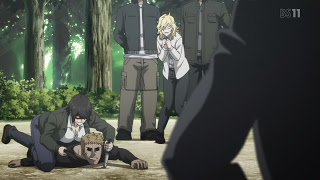 I think, finally, Takahashi always plays straight with the audience. Everything we needed to know about the ending we could have known, if we paid close attention and detached ourselves from our biases. The magic of Jormungand was in creating this absurd world and populating it with larger-than-life characters, and making them all relatable as real people. I can think of few series that have characters that will hold up as icons the way Jonah, Koko, Lehm and the rest will. It was outlandish people doing outrageous things, yet their emotions were very human – it was always possible to see ourselves in them, and that’s why the episodes that focused tightly on the inner workings of Team Koko were most of my favorites. The first season’s “Dragon Shooter” arc, the opening four and 10th episode of “Perfect Order” – these were taut, gripping and spectacular, some of the best action anime in recent memory and stunning in the way they laid the inner workings of the cast bare for all to see.
I think, finally, Takahashi always plays straight with the audience. Everything we needed to know about the ending we could have known, if we paid close attention and detached ourselves from our biases. The magic of Jormungand was in creating this absurd world and populating it with larger-than-life characters, and making them all relatable as real people. I can think of few series that have characters that will hold up as icons the way Jonah, Koko, Lehm and the rest will. It was outlandish people doing outrageous things, yet their emotions were very human – it was always possible to see ourselves in them, and that’s why the episodes that focused tightly on the inner workings of Team Koko were most of my favorites. The first season’s “Dragon Shooter” arc, the opening four and 10th episode of “Perfect Order” – these were taut, gripping and spectacular, some of the best action anime in recent memory and stunning in the way they laid the inner workings of the cast bare for all to see.
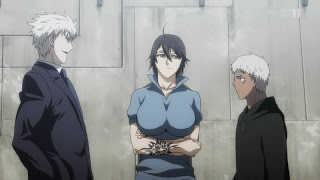 What I take away from Jormungand more than anything is those characters, and the way Takahashi used the absurd to shed light on the human condition. When you can create characters who are universal, yet stand out as completely singular creations, you have a very special talent and White Fox did a fine job of trusting the difficult source material enough to let the audience see it as it was intended to be seen. As with Steins;Gate the studio hasn’t done anything spectacular here in terms of glossy production values, but they’ve delivered in terms of pacing, casting and – especially in Jormungand’s case – music. As I wrote about Jinrui, if I can say “I’ve never seen anything like this before” about a series, that series is off to a pretty good start in my eyes – and that was me feeling from the first chapter of Jormungand until the last episode of the anime. It’s a truly unique and personal creation, and a must for anyone who loves challenging and serious anime.
What I take away from Jormungand more than anything is those characters, and the way Takahashi used the absurd to shed light on the human condition. When you can create characters who are universal, yet stand out as completely singular creations, you have a very special talent and White Fox did a fine job of trusting the difficult source material enough to let the audience see it as it was intended to be seen. As with Steins;Gate the studio hasn’t done anything spectacular here in terms of glossy production values, but they’ve delivered in terms of pacing, casting and – especially in Jormungand’s case – music. As I wrote about Jinrui, if I can say “I’ve never seen anything like this before” about a series, that series is off to a pretty good start in my eyes – and that was me feeling from the first chapter of Jormungand until the last episode of the anime. It’s a truly unique and personal creation, and a must for anyone who loves challenging and serious anime.
![[Asenshi] Jormungand Perfect Order - 24 [nograin][C51D004B].mkv_snapshot_07.12_[2012.12.29_17.00.31] [Asenshi] Jormungand Perfect Order - 24 [nograin][C51D004B].mkv_snapshot_07.12_[2012.12.29_17.00.31]](https://lh5.ggpht.com/-yZzZwVAcNxQ/UN7APetl6VI/AAAAAAACXX8/vcNEv2FuNnk/%25255BAsenshi%25255D%252520Jormungand%252520Perfect%252520Order%252520-%25252024%252520%25255Bnograin%25255D%25255BC51D004B%25255D.mkv_snapshot_07.12_%25255B2012.12.29_17.00.31%25255D_thumb.jpg?imgmax=800) |
![[Asenshi] Jormungand Perfect Order - 24 [nograin][C51D004B].mkv_snapshot_07.21_[2012.12.29_17.00.16] [Asenshi] Jormungand Perfect Order - 24 [nograin][C51D004B].mkv_snapshot_07.21_[2012.12.29_17.00.16]](https://lh4.ggpht.com/---tMjDQzvKE/UN7AR4oiFhI/AAAAAAACXYQ/sefQ8hdh0bE/%25255BAsenshi%25255D%252520Jormungand%252520Perfect%252520Order%252520-%25252024%252520%25255Bnograin%25255D%25255BC51D004B%25255D.mkv_snapshot_07.21_%25255B2012.12.29_17.00.16%25255D_thumb.jpg?imgmax=800) |
![[Asenshi] Jormungand Perfect Order - 24 [nograin][C51D004B].mkv_snapshot_07.57_[2012.12.29_17.01.16] [Asenshi] Jormungand Perfect Order - 24 [nograin][C51D004B].mkv_snapshot_07.57_[2012.12.29_17.01.16]](https://lh6.ggpht.com/-UVfRGz7MFUA/UN7ATx1AEFI/AAAAAAACXYc/WaBlQ_-jXNY/%25255BAsenshi%25255D%252520Jormungand%252520Perfect%252520Order%252520-%25252024%252520%25255Bnograin%25255D%25255BC51D004B%25255D.mkv_snapshot_07.57_%25255B2012.12.29_17.01.16%25255D_thumb.jpg?imgmax=800) |
![[Asenshi] Jormungand Perfect Order - 24 [nograin][C51D004B].mkv_snapshot_08.53_[2012.12.29_17.02.12] [Asenshi] Jormungand Perfect Order - 24 [nograin][C51D004B].mkv_snapshot_08.53_[2012.12.29_17.02.12]](https://lh5.ggpht.com/-v2qTbcf85uU/UN7AVmQUtaI/AAAAAAACXYs/e5XH5dsYxAw/%25255BAsenshi%25255D%252520Jormungand%252520Perfect%252520Order%252520-%25252024%252520%25255Bnograin%25255D%25255BC51D004B%25255D.mkv_snapshot_08.53_%25255B2012.12.29_17.02.12%25255D_thumb.jpg?imgmax=800) |
![[Asenshi] Jormungand Perfect Order - 24 [nograin][C51D004B].mkv_snapshot_09.02_[2012.12.29_17.02.21] [Asenshi] Jormungand Perfect Order - 24 [nograin][C51D004B].mkv_snapshot_09.02_[2012.12.29_17.02.21]](https://lh4.ggpht.com/-whRUKfCUv5k/UN7AX0oOmoI/AAAAAAACXZA/EfneA-AKoss/%25255BAsenshi%25255D%252520Jormungand%252520Perfect%252520Order%252520-%25252024%252520%25255Bnograin%25255D%25255BC51D004B%25255D.mkv_snapshot_09.02_%25255B2012.12.29_17.02.21%25255D_thumb.jpg?imgmax=800) |
![[Asenshi] Jormungand Perfect Order - 24 [nograin][C51D004B].mkv_snapshot_09.25_[2012.12.29_17.02.44] [Asenshi] Jormungand Perfect Order - 24 [nograin][C51D004B].mkv_snapshot_09.25_[2012.12.29_17.02.44]](https://lh6.ggpht.com/-UNJmDI4Wcs4/UN7AZos95UI/AAAAAAACXZM/bS0fK1HINlk/%25255BAsenshi%25255D%252520Jormungand%252520Perfect%252520Order%252520-%25252024%252520%25255Bnograin%25255D%25255BC51D004B%25255D.mkv_snapshot_09.25_%25255B2012.12.29_17.02.44%25255D_thumb.jpg?imgmax=800) |
![[Asenshi] Jormungand Perfect Order - 24 [nograin][C51D004B].mkv_snapshot_10.02_[2012.12.29_17.03.22] [Asenshi] Jormungand Perfect Order - 24 [nograin][C51D004B].mkv_snapshot_10.02_[2012.12.29_17.03.22]](https://lh4.ggpht.com/-NIJX0XhknHM/UN7AbxD-a4I/AAAAAAACXZc/WuevJvaCa2s/%25255BAsenshi%25255D%252520Jormungand%252520Perfect%252520Order%252520-%25252024%252520%25255Bnograin%25255D%25255BC51D004B%25255D.mkv_snapshot_10.02_%25255B2012.12.29_17.03.22%25255D_thumb.jpg?imgmax=800) |
![[Asenshi] Jormungand Perfect Order - 24 [nograin][C51D004B].mkv_snapshot_10.30_[2012.12.29_17.03.49] [Asenshi] Jormungand Perfect Order - 24 [nograin][C51D004B].mkv_snapshot_10.30_[2012.12.29_17.03.49]](https://lh3.ggpht.com/-_mu4XJT29dc/UN7Ad2OFjDI/AAAAAAACXZs/Z4OowNlcYZg/%25255BAsenshi%25255D%252520Jormungand%252520Perfect%252520Order%252520-%25252024%252520%25255Bnograin%25255D%25255BC51D004B%25255D.mkv_snapshot_10.30_%25255B2012.12.29_17.03.49%25255D_thumb.jpg?imgmax=800) |
![[Asenshi] Jormungand Perfect Order - 24 [nograin][C51D004B].mkv_snapshot_11.45_[2012.12.29_17.05.04] [Asenshi] Jormungand Perfect Order - 24 [nograin][C51D004B].mkv_snapshot_11.45_[2012.12.29_17.05.04]](https://lh4.ggpht.com/-5vmcRb__izg/UN7AgCM9tfI/AAAAAAACXaA/cALBkbDspfU/%25255BAsenshi%25255D%252520Jormungand%252520Perfect%252520Order%252520-%25252024%252520%25255Bnograin%25255D%25255BC51D004B%25255D.mkv_snapshot_11.45_%25255B2012.12.29_17.05.04%25255D_thumb.jpg?imgmax=800) |
![[Asenshi] Jormungand Perfect Order - 24 [nograin][C51D004B].mkv_snapshot_12.30_[2012.12.29_17.05.50] [Asenshi] Jormungand Perfect Order - 24 [nograin][C51D004B].mkv_snapshot_12.30_[2012.12.29_17.05.50]](https://lh4.ggpht.com/-rUKfyPa6b78/UN7AiBW9vJI/AAAAAAACXaQ/shOQywiUy1c/%25255BAsenshi%25255D%252520Jormungand%252520Perfect%252520Order%252520-%25252024%252520%25255Bnograin%25255D%25255BC51D004B%25255D.mkv_snapshot_12.30_%25255B2012.12.29_17.05.50%25255D_thumb.jpg?imgmax=800) |
![[Asenshi] Jormungand Perfect Order - 24 [nograin][C51D004B].mkv_snapshot_13.02_[2012.12.29_17.06.37] [Asenshi] Jormungand Perfect Order - 24 [nograin][C51D004B].mkv_snapshot_13.02_[2012.12.29_17.06.37]](https://lh3.ggpht.com/-qODnOfBXXnM/UN7AkS-nMCI/AAAAAAACXac/uKbJhG-DiCQ/%25255BAsenshi%25255D%252520Jormungand%252520Perfect%252520Order%252520-%25252024%252520%25255Bnograin%25255D%25255BC51D004B%25255D.mkv_snapshot_13.02_%25255B2012.12.29_17.06.37%25255D_thumb.jpg?imgmax=800) |
![[Asenshi] Jormungand Perfect Order - 24 [nograin][C51D004B].mkv_snapshot_14.36_[2012.12.29_17.08.12] [Asenshi] Jormungand Perfect Order - 24 [nograin][C51D004B].mkv_snapshot_14.36_[2012.12.29_17.08.12]](https://lh3.ggpht.com/-RDnpXwV9fm8/UN7AmDUUcPI/AAAAAAACXas/w0nX4Q6Zy0A/%25255BAsenshi%25255D%252520Jormungand%252520Perfect%252520Order%252520-%25252024%252520%25255Bnograin%25255D%25255BC51D004B%25255D.mkv_snapshot_14.36_%25255B2012.12.29_17.08.12%25255D_thumb.jpg?imgmax=800) |
![[Asenshi] Jormungand Perfect Order - 24 [nograin][C51D004B].mkv_snapshot_14.45_[2012.12.29_17.08.21] [Asenshi] Jormungand Perfect Order - 24 [nograin][C51D004B].mkv_snapshot_14.45_[2012.12.29_17.08.21]](https://lh3.ggpht.com/-g1Axl-MW_Mc/UN7An2h1WUI/AAAAAAACXbA/wYY6gf7BkCc/%25255BAsenshi%25255D%252520Jormungand%252520Perfect%252520Order%252520-%25252024%252520%25255Bnograin%25255D%25255BC51D004B%25255D.mkv_snapshot_14.45_%25255B2012.12.29_17.08.21%25255D_thumb.jpg?imgmax=800) |
![[Asenshi] Jormungand Perfect Order - 24 [nograin][C51D004B].mkv_snapshot_14.48_[2012.12.29_17.08.24] [Asenshi] Jormungand Perfect Order - 24 [nograin][C51D004B].mkv_snapshot_14.48_[2012.12.29_17.08.24]](https://lh3.ggpht.com/-EEb8ExTvJw0/UN7Ap5PJtiI/AAAAAAACXbM/U_p8N6oZrdc/%25255BAsenshi%25255D%252520Jormungand%252520Perfect%252520Order%252520-%25252024%252520%25255Bnograin%25255D%25255BC51D004B%25255D.mkv_snapshot_14.48_%25255B2012.12.29_17.08.24%25255D_thumb.jpg?imgmax=800) |
![[Asenshi] Jormungand Perfect Order - 24 [nograin][C51D004B].mkv_snapshot_15.11_[2012.12.29_17.08.46] [Asenshi] Jormungand Perfect Order - 24 [nograin][C51D004B].mkv_snapshot_15.11_[2012.12.29_17.08.46]](https://lh3.ggpht.com/-zdQ_HiEDKFg/UN7Asb9T2BI/AAAAAAACXbc/c8e_IJYz_iM/%25255BAsenshi%25255D%252520Jormungand%252520Perfect%252520Order%252520-%25252024%252520%25255Bnograin%25255D%25255BC51D004B%25255D.mkv_snapshot_15.11_%25255B2012.12.29_17.08.46%25255D_thumb.jpg?imgmax=800) |
![[Asenshi] Jormungand Perfect Order - 24 [nograin][C51D004B].mkv_snapshot_15.24_[2012.12.29_17.09.01] [Asenshi] Jormungand Perfect Order - 24 [nograin][C51D004B].mkv_snapshot_15.24_[2012.12.29_17.09.01]](https://lh3.ggpht.com/-d32v5SCo4Ss/UN7AuTk_wdI/AAAAAAACXbs/f8IwTuJbfe8/%25255BAsenshi%25255D%252520Jormungand%252520Perfect%252520Order%252520-%25252024%252520%25255Bnograin%25255D%25255BC51D004B%25255D.mkv_snapshot_15.24_%25255B2012.12.29_17.09.01%25255D_thumb.jpg?imgmax=800) |
![[Asenshi] Jormungand Perfect Order - 24 [nograin][C51D004B].mkv_snapshot_15.50_[2012.12.29_17.09.25] [Asenshi] Jormungand Perfect Order - 24 [nograin][C51D004B].mkv_snapshot_15.50_[2012.12.29_17.09.25]](https://lh3.ggpht.com/-szb9oFPO4OU/UN7AwVnbq4I/AAAAAAACXb8/skARrYlkgPk/%25255BAsenshi%25255D%252520Jormungand%252520Perfect%252520Order%252520-%25252024%252520%25255Bnograin%25255D%25255BC51D004B%25255D.mkv_snapshot_15.50_%25255B2012.12.29_17.09.25%25255D_thumb.jpg?imgmax=800) |
![[Asenshi] Jormungand Perfect Order - 24 [nograin][C51D004B].mkv_snapshot_16.21_[2012.12.29_17.09.57] [Asenshi] Jormungand Perfect Order - 24 [nograin][C51D004B].mkv_snapshot_16.21_[2012.12.29_17.09.57]](https://lh5.ggpht.com/-3GLc1K05EDo/UN7Ax4ZPJuI/AAAAAAACXcM/iaAo8FR01XY/%25255BAsenshi%25255D%252520Jormungand%252520Perfect%252520Order%252520-%25252024%252520%25255Bnograin%25255D%25255BC51D004B%25255D.mkv_snapshot_16.21_%25255B2012.12.29_17.09.57%25255D_thumb.jpg?imgmax=800) |
![[Asenshi] Jormungand Perfect Order - 24 [nograin][C51D004B].mkv_snapshot_16.35_[2012.12.29_17.10.10] [Asenshi] Jormungand Perfect Order - 24 [nograin][C51D004B].mkv_snapshot_16.35_[2012.12.29_17.10.10]](https://lh5.ggpht.com/-DVK__BO5jmk/UN7AziwcghI/AAAAAAACXcc/H0a_MD6_RA4/%25255BAsenshi%25255D%252520Jormungand%252520Perfect%252520Order%252520-%25252024%252520%25255Bnograin%25255D%25255BC51D004B%25255D.mkv_snapshot_16.35_%25255B2012.12.29_17.10.10%25255D_thumb.jpg?imgmax=800) |
![[Asenshi] Jormungand Perfect Order - 24 [nograin][C51D004B].mkv_snapshot_16.37_[2012.12.29_17.10.12] [Asenshi] Jormungand Perfect Order - 24 [nograin][C51D004B].mkv_snapshot_16.37_[2012.12.29_17.10.12]](https://lh5.ggpht.com/-uloZlMdV1ak/UN7A131b75I/AAAAAAACXcs/41LKUw-_Ikk/%25255BAsenshi%25255D%252520Jormungand%252520Perfect%252520Order%252520-%25252024%252520%25255Bnograin%25255D%25255BC51D004B%25255D.mkv_snapshot_16.37_%25255B2012.12.29_17.10.12%25255D_thumb.jpg?imgmax=800) |
![[Asenshi] Jormungand Perfect Order - 24 [nograin][C51D004B].mkv_snapshot_16.50_[2012.12.29_17.10.25] [Asenshi] Jormungand Perfect Order - 24 [nograin][C51D004B].mkv_snapshot_16.50_[2012.12.29_17.10.25]](https://lh3.ggpht.com/-JJs47Uz2tnY/UN7A3TknFGI/AAAAAAACXdA/muD_e7SYWG0/%25255BAsenshi%25255D%252520Jormungand%252520Perfect%252520Order%252520-%25252024%252520%25255Bnograin%25255D%25255BC51D004B%25255D.mkv_snapshot_16.50_%25255B2012.12.29_17.10.25%25255D_thumb.jpg?imgmax=800) |
![[Asenshi] Jormungand Perfect Order - 24 [nograin][C51D004B].mkv_snapshot_17.01_[2012.12.29_17.10.52] [Asenshi] Jormungand Perfect Order - 24 [nograin][C51D004B].mkv_snapshot_17.01_[2012.12.29_17.10.52]](https://lh6.ggpht.com/-rjGOHV3YSbE/UN7A5RxyHMI/AAAAAAACXdQ/2ECvUB7HmAg/%25255BAsenshi%25255D%252520Jormungand%252520Perfect%252520Order%252520-%25252024%252520%25255Bnograin%25255D%25255BC51D004B%25255D.mkv_snapshot_17.01_%25255B2012.12.29_17.10.52%25255D_thumb.jpg?imgmax=800) |
![[Asenshi] Jormungand Perfect Order - 24 [nograin][C51D004B].mkv_snapshot_17.06_[2012.12.29_17.10.41] [Asenshi] Jormungand Perfect Order - 24 [nograin][C51D004B].mkv_snapshot_17.06_[2012.12.29_17.10.41]](https://lh5.ggpht.com/-LVs-0bQtZiw/UN7A7veQgoI/AAAAAAACXdc/muQ4Bha5KHo/%25255BAsenshi%25255D%252520Jormungand%252520Perfect%252520Order%252520-%25252024%252520%25255Bnograin%25255D%25255BC51D004B%25255D.mkv_snapshot_17.06_%25255B2012.12.29_17.10.41%25255D_thumb.jpg?imgmax=800) |
![[Asenshi] Jormungand Perfect Order - 24 [nograin][C51D004B].mkv_snapshot_18.17_[2012.12.29_17.12.08] [Asenshi] Jormungand Perfect Order - 24 [nograin][C51D004B].mkv_snapshot_18.17_[2012.12.29_17.12.08]](https://lh4.ggpht.com/-OtXgEV6R7GU/UN7A9pUzVoI/AAAAAAACXdw/j8u-hu8UmYs/%25255BAsenshi%25255D%252520Jormungand%252520Perfect%252520Order%252520-%25252024%252520%25255Bnograin%25255D%25255BC51D004B%25255D.mkv_snapshot_18.17_%25255B2012.12.29_17.12.08%25255D_thumb.jpg?imgmax=800) |
![[Asenshi] Jormungand Perfect Order - 24 [nograin][C51D004B].mkv_snapshot_18.49_[2012.12.29_17.12.39] [Asenshi] Jormungand Perfect Order - 24 [nograin][C51D004B].mkv_snapshot_18.49_[2012.12.29_17.12.39]](https://lh4.ggpht.com/-azf08du5wqA/UN7A_o6PzXI/AAAAAAACXd8/vo_QrG2RSm8/%25255BAsenshi%25255D%252520Jormungand%252520Perfect%252520Order%252520-%25252024%252520%25255Bnograin%25255D%25255BC51D004B%25255D.mkv_snapshot_18.49_%25255B2012.12.29_17.12.39%25255D_thumb.jpg?imgmax=800) |
![[Asenshi] Jormungand Perfect Order - 24 [nograin][C51D004B].mkv_snapshot_19.16_[2012.12.29_17.13.07] [Asenshi] Jormungand Perfect Order - 24 [nograin][C51D004B].mkv_snapshot_19.16_[2012.12.29_17.13.07]](https://lh3.ggpht.com/-30OV3JKjZzU/UN7BBQ2LyKI/AAAAAAACXeM/wbrte77r4BU/%25255BAsenshi%25255D%252520Jormungand%252520Perfect%252520Order%252520-%25252024%252520%25255Bnograin%25255D%25255BC51D004B%25255D.mkv_snapshot_19.16_%25255B2012.12.29_17.13.07%25255D_thumb.jpg?imgmax=800) |
![[Asenshi] Jormungand Perfect Order - 24 [nograin][C51D004B].mkv_snapshot_20.30_[2012.12.29_17.14.20] [Asenshi] Jormungand Perfect Order - 24 [nograin][C51D004B].mkv_snapshot_20.30_[2012.12.29_17.14.20]](https://lh5.ggpht.com/-D5QJW9ctu0k/UN7BDEUWHII/AAAAAAACXeg/bkKiWJF0QDI/%25255BAsenshi%25255D%252520Jormungand%252520Perfect%252520Order%252520-%25252024%252520%25255Bnograin%25255D%25255BC51D004B%25255D.mkv_snapshot_20.30_%25255B2012.12.29_17.14.20%25255D_thumb.jpg?imgmax=800) |
![[Asenshi] Jormungand Perfect Order - 24 [nograin][C51D004B].mkv_snapshot_20.39_[2012.12.29_17.14.30] [Asenshi] Jormungand Perfect Order - 24 [nograin][C51D004B].mkv_snapshot_20.39_[2012.12.29_17.14.30]](https://lh4.ggpht.com/-6zrVCHR7AdI/UN7BE8byvpI/AAAAAAACXew/ytKvitVjLJ8/%25255BAsenshi%25255D%252520Jormungand%252520Perfect%252520Order%252520-%25252024%252520%25255Bnograin%25255D%25255BC51D004B%25255D.mkv_snapshot_20.39_%25255B2012.12.29_17.14.30%25255D_thumb.jpg?imgmax=800) |
![[Asenshi] Jormungand Perfect Order - 24 [nograin][C51D004B].mkv_snapshot_21.03_[2012.12.29_17.14.54] [Asenshi] Jormungand Perfect Order - 24 [nograin][C51D004B].mkv_snapshot_21.03_[2012.12.29_17.14.54]](https://lh3.ggpht.com/-Gc2pTQu0nY4/UN7BG5Zlt3I/AAAAAAACXe8/B68SVPf6w-A/%25255BAsenshi%25255D%252520Jormungand%252520Perfect%252520Order%252520-%25252024%252520%25255Bnograin%25255D%25255BC51D004B%25255D.mkv_snapshot_21.03_%25255B2012.12.29_17.14.54%25255D_thumb.jpg?imgmax=800) |
![[Asenshi] Jormungand Perfect Order - 24 [nograin][C51D004B].mkv_snapshot_21.27_[2012.12.29_17.15.17] [Asenshi] Jormungand Perfect Order - 24 [nograin][C51D004B].mkv_snapshot_21.27_[2012.12.29_17.15.17]](https://lh5.ggpht.com/-XxCO4Gl1jVk/UN7BJITWylI/AAAAAAACXfQ/oRtfA6ZeKbU/%25255BAsenshi%25255D%252520Jormungand%252520Perfect%252520Order%252520-%25252024%252520%25255Bnograin%25255D%25255BC51D004B%25255D.mkv_snapshot_21.27_%25255B2012.12.29_17.15.17%25255D_thumb.jpg?imgmax=800) |
![[Asenshi] Jormungand Perfect Order - 24 [nograin][C51D004B].mkv_snapshot_21.48_[2012.12.29_17.15.39] [Asenshi] Jormungand Perfect Order - 24 [nograin][C51D004B].mkv_snapshot_21.48_[2012.12.29_17.15.39]](https://lh5.ggpht.com/-cF67mQouXNA/UN7BLkg04nI/AAAAAAACXfg/KOHUf6cF1vI/%25255BAsenshi%25255D%252520Jormungand%252520Perfect%252520Order%252520-%25252024%252520%25255Bnograin%25255D%25255BC51D004B%25255D.mkv_snapshot_21.48_%25255B2012.12.29_17.15.39%25255D_thumb.jpg?imgmax=800) |
![[Asenshi] Jormungand Perfect Order - 24 [nograin][C51D004B].mkv_snapshot_23.21_[2012.12.29_17.17.12] [Asenshi] Jormungand Perfect Order - 24 [nograin][C51D004B].mkv_snapshot_23.21_[2012.12.29_17.17.12]](https://lh6.ggpht.com/-gf0FJcEnMG4/UN7BO9zk96I/AAAAAAACXfs/bymIFKdrrOo/%25255BAsenshi%25255D%252520Jormungand%252520Perfect%252520Order%252520-%25252024%252520%25255Bnograin%25255D%25255BC51D004B%25255D.mkv_snapshot_23.21_%25255B2012.12.29_17.17.12%25255D_thumb.jpg?imgmax=800) |
![[Asenshi] Jormungand Perfect Order - 24 [nograin][C51D004B].mkv_snapshot_23.29_[2012.12.29_18.54.36] [Asenshi] Jormungand Perfect Order - 24 [nograin][C51D004B].mkv_snapshot_23.29_[2012.12.29_18.54.36]](https://lh3.ggpht.com/-zyrhRhzgJMM/UN7BSAe45SI/AAAAAAACXgA/51I1bGtkMFw/%25255BAsenshi%25255D%252520Jormungand%252520Perfect%252520Order%252520-%25252024%252520%25255Bnograin%25255D%25255BC51D004B%25255D.mkv_snapshot_23.29_%25255B2012.12.29_18.54.36%25255D_thumb.jpg?imgmax=800) |


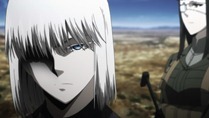
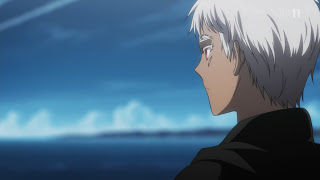


Anonymous
December 29, 2012 at 1:21 pmI personally didn't see the magic of Jormungand until the final three episodes – but now I can confidently say it's one of the most cruel yet frighteningly intelligent series I've come across in a long time. And I think the way the relationship between Jonah and Koko and the way it was resolved (or not?) was some really brilliant writing right there. Jormungand walked a precarious tightrope when it came to how it treated its audience – for a long time, I felt detached from the action and frustrated as a viewer – but on retrospect, I can say there was no better execution this series could have had for the effect it was trying to achieve.
Franka
December 29, 2012 at 1:51 pmJormungand is a remarkable anime.
And Enzo this is a remarkable review.
I salute thee.
SQA
December 29, 2012 at 9:05 pmWell, Jormungand did answer what the scariest thing in that entire universe is: Dere-dere Chiquita losing her Jonah.
More seriously, Jormungand ended the way it needed to. Kaspar pointed out the one fatal issue with Koko's plan: War Abides. In many ways, his brilliant line was a recap of Einstein's famous quote, "I know not with what weapons World War III will be fought, but World War IV will be fought with sticks and stones." No matter what the technology, war will still be fought.
Which is why the series has to end on the activation of Jormungand. Koko is crazy, but she's crazy & capable enough to change the world. The system might not completely shut down air travel, but the strategic balance would change in ways you simply can't predict. Thus, it's the start of a New World and Jonah has picked his side.
One other thing to keep in mind. "War" as we understand it has changed multiple times. Depending on how you break things down, we're in at least the 4th generation of warfare (though you can break it up even more, obviously). Further, this is a work made in Japan by a Japanese writer and, for the anime, Japanese writing crew. Japan witnessed the entire World change in August 1945. The Nuclear Age changed World politics and strategic balance. What was previously the age of the Tank and Battleship became the age of the Carrier and Strategic Bomber. It further might become the age of the UAV Drone and Satellite Weapons platform. We don't know, which is what Jormungand is really all about. We don't actually know the future, but the world is crazy.
And so is Koko.
Anonymous
December 29, 2012 at 9:05 pmI did find the ending to be unsatisfying–unsatisfying because it was pretty much exactly the ending I was expecting. The message came out as what I took it to be all along, war is inevitable and even fancy tricks won't get you out of that.
I thought there was an opportunity for a message which was more nuanced and more interesting and more realistic all at once: Conflict is inevitable, and if you fight fire with fire as in my view Koko does then you end up with more fire, but this does not mean that armed conflict is inevitable. There are ways forward and we have taken them; read Thucydides if you think that war has not decreased over long periods! It would have needed only a slight change to the story and minor shifts of emphasis to make that point instead, and I thought there was an opportunity for it until the last episode.
So for me Jormungand is only an unusually good series, not an excellent one.
melodic thoughts
December 29, 2012 at 9:37 pmkoko trying to play God?
i disagree with anonymous above that jormungand features a fictional world, albeit the humanness in it, so it's best not to take the politics and war so seriously. i, for one, have faith in humanity.
somehow or other, i thought of something from george orwell's 1984, that an individual is powerless because he is not immortal. i kind of feel for koko how lonely and powerless she is, and how she will remain to be. her plan cannot bring redemption… but at least she's trying
melodic thoughts
December 29, 2012 at 9:38 pmsorry typo above.
i disagree with anonymous above. jormungand….*
Anonymous
December 29, 2012 at 10:29 pmahh~~. Koko was a daddy's little girl after all.
Awet M
December 31, 2012 at 10:45 pmTouche, anonymous.
Jormungand is one of the best shows I've seen this year, but had it been more consistent in scope (given the larger ambitions of the second season) it would've cracked my top anime of 2012 list: http://www.hyperboreans.com/heterodoxia/?p=806
As for adaptations, they are all changes that abridge or rework the original material for a new medium. However, every adaptation must stand on its own, which means it must be judged on how it tells a story, not how faithful it was to the details in the source material. Anime is a graphically oriented space that present emotion & intention with the arrangement of images, whereas print (books or manga) allow the reader access to the character's mind, as well as the narrator's.
It is worth noting that on a list of the greatest films ever, the majority of them are based on books. E.g., Godfather, Gone with the Wind, Wizard of Oz, Graduate, Schindler's List, etc. But more importantly, each masterpiece all take tremendous liberties with the original material (changes, alterations, deletions, streamlining central literary story, etc) but nobody can legitimately call them failures or betrayals of the original. As long we allow ourselves the permission to enjoy two different variants, and let go of the fanboy mentality of proprietary outrage, we are much better off.
I haven't read the Jormungand manga to better assess the relationship, but I can vouchsafe for the anime as a brilliant presentation of 2012.